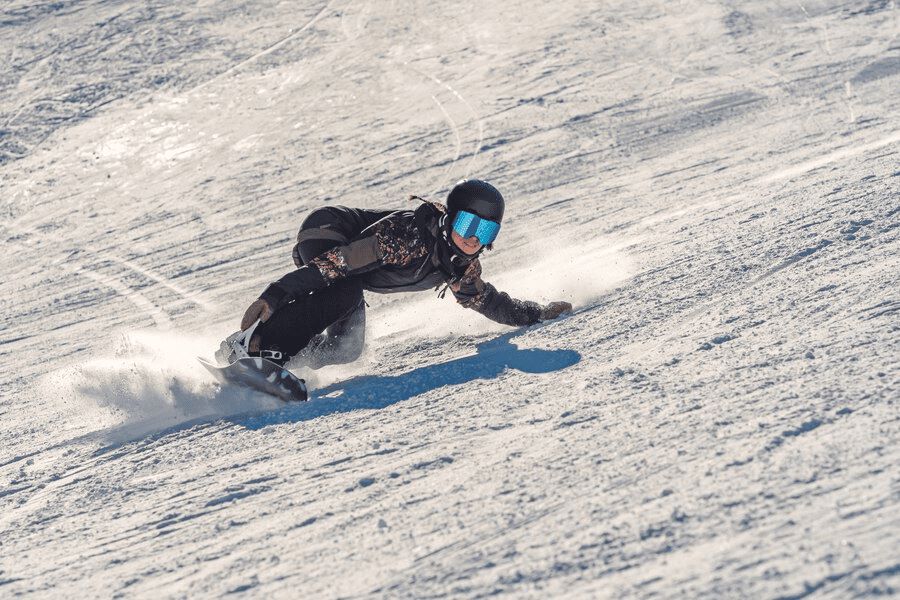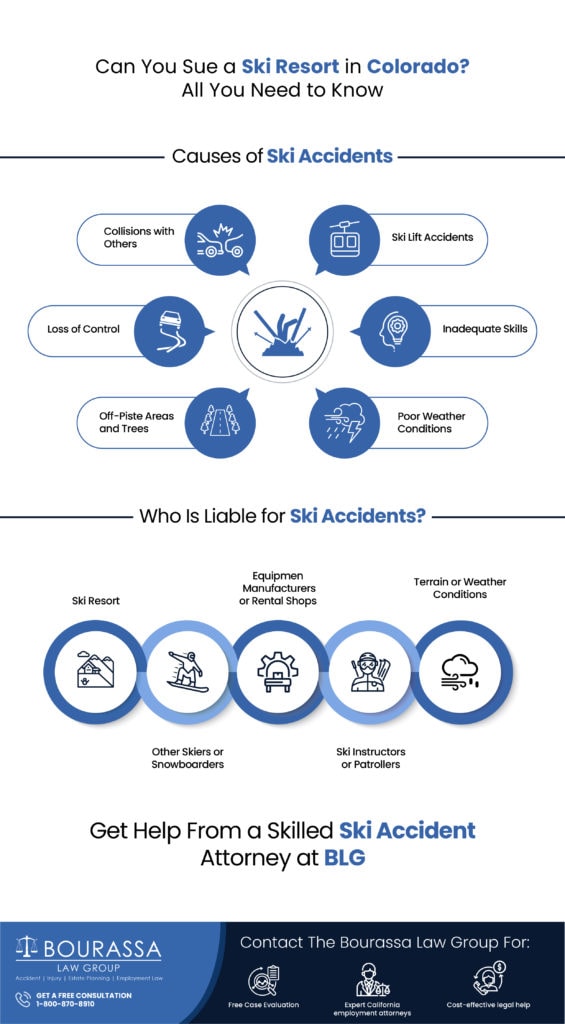
Colorado, renowned for its majestic mountains and world-class ski resorts, attracts millions of visitors each year seeking the thrill of winter sports. While the state offers an exhilarating environment for skiing and snowboarding, accidents can happen, raising questions about legal recourse and the ability to sue a ski resort. Understanding the legal landscape surrounding such incidents is crucial for those seeking compensation for injuries sustained on the slopes.
If you find yourself injured at a Colorado ski resort, you might wonder: Can you sue a ski resort? This article will delve into the complexities of ski resort liability in Colorado and provide valuable information for those seeking legal guidance after a ski accident.
What Is the Colorado Ski Safety Act?
The Colorado Ski Safety Act outlines ski area operators’ responsibilities and liabilities in the state, aiming to promote safety while acknowledging skiing’s inherent risks. The Act recognizes dangers like variable snow conditions, weather changes, and actions of other skiers, underscoring the importance of skier responsibility and adherence to rules.
Can I Sue a Ski Resort for an Injury?
Skiing and snowboarding are exciting winter activities, but accidents can happen, and injuries may occur while you’re enjoying the slopes. If you’ve been injured at a ski resort, you may wonder if you can sue the resort for your injury. The possibility of a successful lawsuit largely depends on the circumstances of the incident. Here are some key factors to consider:
Assumption of Risk:
Skiing and snowboarding come with inherent risks, which are often outlined in the fine print of your lift ticket or season pass. These risks may include icy patches, changing weather conditions, and collisions with other skiers or snowboarders. Many ski resorts have guests acknowledge these risks through a liability waiver, which limits the resort’s liability.
Negligence:
To successfully sue a ski resort for an injury, you would typically need to prove that the resort was negligent in its duties. This might include situations where the resort failed to properly maintain the slopes, provide adequate warning signs, or operate ski lifts safely. Negligent behavior by resort employees, such as ski instructors or patrollers, can also be grounds for a lawsuit.
Equipment or Facility Failures:
In case, you get injured due to faulty equipment or any facility, you have the right to file a valid claim case. This could include incidents involving ski lifts, bindings, or rental equipment.
Consult with an Attorney:
Hiring an attorney is a smart move if you want to file a claim case. They can help you understand the legal process, gather evidence, and represent your case on your behalf.
Inherent Dangers and Risks
Colorado’s Ski Safety Act emphasizes that skiing is inherently dangerous, and participants must be aware of these risks. It also notes that the ski area operators’ primary responsibility is to maintain safe conditions and manage the ski area. This means that while skiing, you should always be on the lookout for potential hazards and be prepared for the inherent dangers associated with the sport.
Common Causes of Ski Accidents
Skiing is a thrilling winter sport, but it comes with inherent risks. Understanding these common causes of ski accidents can help you stay safe on the slopes:
Collisions with Others:
High speeds and inexperience can lead to collisions.
Reduce the risk by skiing within your skill level and being aware of your surroundings.
Loss of Control:
Icy terrain, poor equipment, or excessive speed can result in loss of control.
Prevent accidents by skiing at a reasonable speed and maintaining your equipment.
Off-Piste and Trees:
Reduced visibility and deep snow can lead to accidents in wooded or off-piste areas.
Stay safe by skiing with a group and carrying the necessary safety equipment.
Ski Lift Accidents:
Mechanical failures or passenger errors can cause lift accidents.
Follow resort instructions and report any issues to resort personnel.
Avalanches:
In avalanche-prone areas, skiers face the risk of avalanches.
Check forecasts, carry safety gear, and ski with others following safe procedures.
Inadequate Skill:
Inexperienced skiers can make poor decisions.
Take lessons, ski within your ability, and be aware of your limitations.
Poor Weather Conditions:
Skiing in adverse weather increases the risk of accidents.
Check weather forecasts and be prepared with appropriate gear.
Steps to Take After an Accident:
Document the Scene: If an accident occurs, document the scene by taking photographs. Capture the conditions, any signage, and the immediate area where the incident occurred.
Seek Medical Attention: Prioritize your health and seek medical attention promptly. Medical records are crucial in establishing the extent of injuries and can be important evidence in a legal claim.
Report the Incident: Report the incident to the ski resort as soon as possible. Obtain a copy of the incident report and make sure it accurately reflects the details of the accident.
Preserve Evidence: Preserve any evidence related to the accident, such as damaged equipment or clothing. This can be useful in building a case.
Who Is Liable for Ski Accidents?
It’s important to note that liability for a ski accident can vary depending on the specific circumstances of the incident. Determining liability often involves a thorough investigation and assessment of the facts surrounding the accident. Here are some potential parties that may be liable for a ski accident:
Ski Resort:
Ski resorts have a responsibility to maintain safe conditions, provide clear warning signs for potential hazards, and operate ski lifts safely. If the accident occurred due to the resort’s negligence, such as poor maintenance, inadequate signage, or improper operation of equipment, the resort may be liable.
Other Skiers or Snowboarders:
If another skier or snowboarder’s actions directly caused the accident, they could be held responsible, especially if they were skiing recklessly or not adhering to the rules and safety guidelines.
Equipment Manufacturers or Rental Shops:
In cases where equipment failure played a role in the accident, the equipment manufacturer or the rental shop that provided the gear may be liable.
Ski Instructors or Patrollers:
If the accident was the result of negligent behavior or instructions from a ski instructor or patrollers employed by the resort ski patrol, they could be held responsible.
Terrain or Weather Conditions:
In some situations, the natural terrain or adverse weather conditions may contribute to accidents. However, ski resorts are typically well-prepared to handle such conditions, and liability may depend on the resort’s response to these challenges.
When Can I Sue for a Skiing Injury in Colorado?
A person skiing downhill in Colorado offers the thrill of gliding down pristine slopes with breathtaking mountain scenery. However, accidents can happen, and if you’ve been injured at a ski resort in Colorado, you may wonder when you can sue the resort for your injury. While the Colorado Ski Safety Act provides ski resorts with certain protections, there are circumstances in which you may have a legal basis for a lawsuit.
Proving Negligence:
To sue a ski resort for an injury in Colorado, you generally need to establish negligence on their part. This could include cases where the resort failed to maintain the ski slopes, improperly marked hazards, or operated ski lifts negligently.
Inadequate Warning Signs:
Ski resorts have a duty to provide clear and adequate warning signs for potential hazards. If you were injured due to a lack of or insufficient warnings, you may have a legal case.
Reckless Behavior of Ski Resort Employees:
Negligent or reckless actions by ski resort employees, such as ski patrollers or instructors, can lead to injuries. If their actions or instructions contributed to your accident, you may have a valid claim.
Uphill Skier Accidents:
In cases of uphill skier accidents, where another skier collided with you from behind, liability depends on the circumstances. If the uphill skier was skiing recklessly or outside their skill level, the other skier could be held responsible for your injury.
Ski Lift Accidents:
Ski lift accidents can result from mechanical failures or operator errors. If the resort failed to maintain or operate the lift safely, you may have a valid claim.
Injuries Caused by Defective Equipment:
If your injury is the result of using defective rental equipment provided by the ski resort, you might have a claim against the resort or the equipment manufacturer.
Contacting a Legal Expert for Guidance
Experiencing a ski accident can be a traumatic and challenging situation. When you’ve been injured on a ski slope due to someone else’s negligence or a combination of factors, seeking legal representation is often essential. Here’s why an attorney is crucial in the aftermath of a skiing accident:
Legal Expertise: Specialized attorneys understand personal injury laws and the complexities of ski accidents.
Investigation: They conduct thorough investigations, gathering evidence and assessing liability.
Assessing Liability: Attorneys determine responsible parties, such as ski resorts or equipment manufacturers.
Protecting Rights: They act as advocates, ensuring your rights are protected during the legal process.
Negotiation and Litigation: Skilled attorneys negotiate for fair compensation and, if necessary, represent you in court.
Managing Legal Process: Attorneys handle paperwork, deadlines, and court procedures, relieving your burden.
Maximizing Compensation: They work to secure ample compensation for medical bills, lost income, and emotional distress.
Access to Expert Witnesses: Attorneys can bring in experts to testify on various case aspects.
Ski-Specific Laws: Specialized attorneys understand state-specific ski resort regulations, ensuring compliance.
Peace of Mind: Having an attorney provides peace of mind, knowing your interests are protected.

Get Help From a Skilled Ski Accident Attorney at BLG
In conclusion, while skiing in Colorado can be an exhilarating experience, it’s vital to recognize the inherent risks and the responsibilities of all parties involved. If you’ve been injured in a ski accident, you may have legal options to pursue compensation, depending on the circumstances of your case. Don’t hesitate to reach out for a free consultation to explore your legal rights and potential claims.
At BLG, we have a team of experienced attorneys who can help you navigate the legal complexities surrounding ski resort accidents in Colorado. We offer a free consultation to evaluate your case and provide guidance on whether you have a valid claim. Our expert legal representation will assist you in seeking compensation for your injuries and any related expenses.
Contact us for a free consultation. We are here to guide you through the complexities of ski resort accident cases and help you seek the compensation you deserve.




